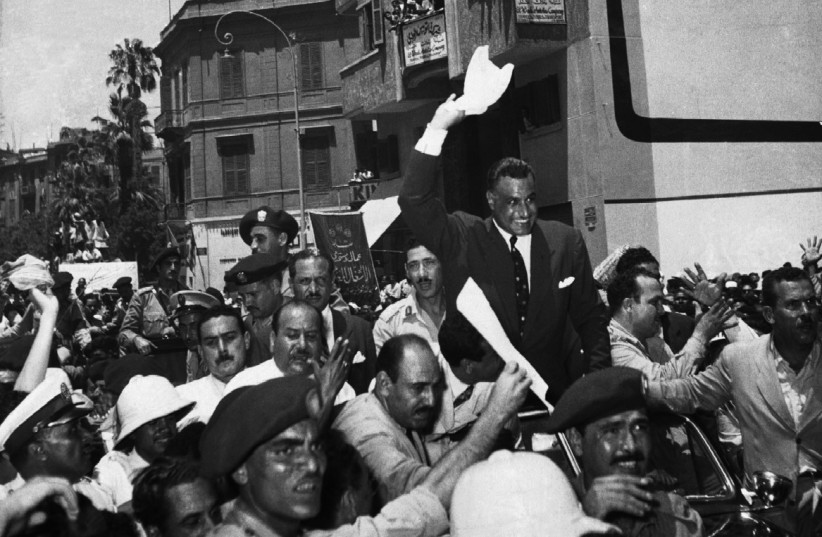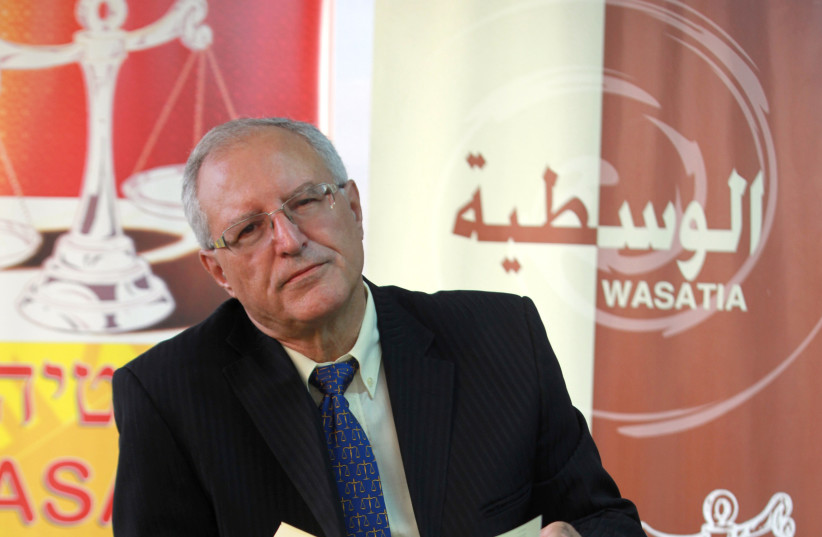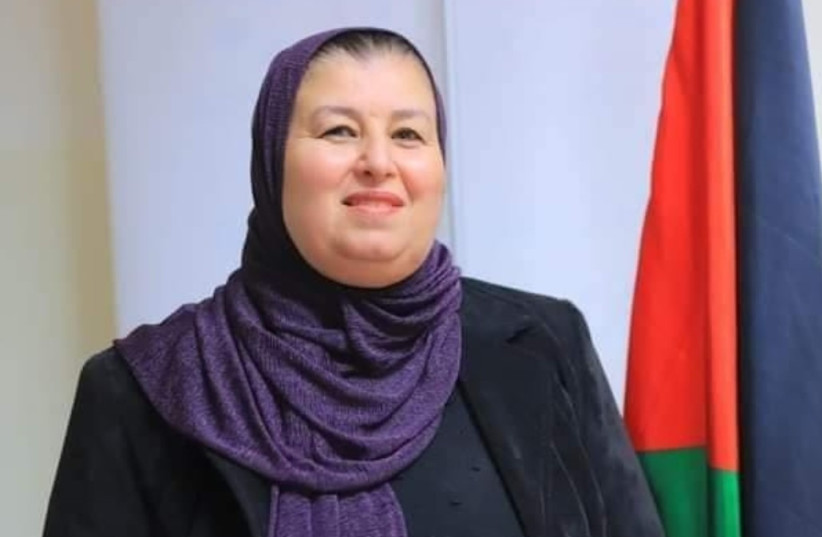The Six Day War shattered the illusions of many Arabs, including Palestinians, about Arab military power.
One of them is east Jerusalem’s Mohammed Dajani, a prominent professor and peace activist who gained international recognition for his work in helping raise awareness about the Holocaust.
For more stories released for the 55th anniversary of the Six Day War, click here.
“We were in a festive mood during the months before the [1967] war,” recounted Dajani, who belongs to one of Jerusalem’s historic Arab families. “Everyone believed that the Arab armies would defeat Israel and liberate Palestine. None thought, ‘What if Israel won the war?’ Thus it was a big shock throughout the Arab world when Egyptian president Gamal Abdel Nasser admitted defeat in a television speech and tendered his resignation.
“Everyone believed that the Arab armies would defeat Israel and liberate Palestine. None thought, ‘What if Israel won the war?’ Thus it was a big shock throughout the Arab world when Egyptian president Gamal Abdel Nasser admitted defeat in a television speech and tendered his resignation.”
Mohammed Dajani
“Massive Egyptian demonstrations forced him to withdraw his resignation, which many viewed as a victory. The war shattered my illusions about Arab military power. It motivated me to join the Fatah liberation movement to adopt the Vietnamese guerrilla tactics to liberate Palestine, which later proved to be another delusion.”
Fifty-five years later, Palestinians continue to refer to the Six Day War as a naksa (setback), a reference to the defeat of a coalition of Arab armies by Israel.

The naksa
Naksa should not be confused with nakba (catastrophe), which refers to the displacement of hundreds of thousands of Arabs during and after the 1948 Israeli War of Independence. For many Palestinians, the two events serve as a painful reminder that Israel is a powerful state that is here to stay. The events also serve as a reminder of the weakness of their Arab brothers and the growing isolation of the Palestinians in the Arab world.
Many Palestinians don’t seem to be optimistic about their future as they mark the 55th anniversary of the war, which resulted in Israel controlling the two areas where they live – the West Bank and Gaza Strip.
The feeling among many Palestinians is that they are not closer to achieving their national and political aspirations than they were a few decades ago. They look at their situation today and they see that they are living in two rival mini-states – one under the Palestinian Authority in the West Bank and a second controlled by Hamas in the Gaza Strip.
The split between the two territories, which began with Hamas’s violent takeover of the Gaza Strip in the summer of 2007, is often described by some Palestinians as another naksa. Why? The power struggle between the Palestinian Authority and Hamas is seen by these Palestinians as the final nail in the coffin of the dream to establish an independent Palestinian state.
While many Palestinians continue to voice pessimism about their future, especially in light of the ongoing conflict between Hamas and the PA, others insist there’s still room for hope.
“As an optimist, I believe that the Palestinians are closer to achieving their aspirations,” Dajani said. “But it depends on clarifying what these aspirations are? If their aspiration envisions the liberation of Palestine and the creation of a state from the Jordan River to the Mediterranean Sea, this is an illusion far to achieve. But if their goal is the creation of the State of Palestine next to the State of Israel, then this two-state solution is close to achieve. To move closer, they should adopt it and leave behind the one-state idea of a past that was never there.”
Dajani dismissed the widespread perception that there is no viable solution for the Israeli-Palestinian conflict.
“Throughout history, though this land was called Palestine, we never had a state of Palestine ruled by Palestinians with Jerusalem as its capital,” he pointed out. “To claim the conflict is one without a viable solution means you have not invested enough effort to seek answers.”
Dajani noted that at present there are at least three leading potential solutions that are being discussed to end the conflict: The one-state solution, the confederacy solution and the two-state solution.
“The one-state solution requires two peoples with more than a century of conflict to trust and cooperate to live together in a unified state,” he said. “People are not angels. This is not practical with the lack of trust between both people. It challenges both Zionism and Palestinian nationalism.”
A confederacy holds between equal political entities, and that’s why it’s not practical, according to Dajani.
“It is not practical since no political asymmetry exists between the State of Israel and the Palestinian Authority or organizational entity,” he explained.
On the other hand, the two-state solution, i.e., a Jewish state and a Palestinian state, complies with the 1947 UN Resolution 181, which called for the partition of Palestine and the establishment of Arab and Jewish states, he argued.
“The international community has adopted the two-state solution, which is predicated on the basic existential needs of the two parties, significantly national identity,” Dajani added. “Each party wants a state reflecting its national identity. It is neither delusion nor fantasy. It is a viable framework for reconciliation if we wish to achieve a lasting peace between Palestine and Israel.”

Asked about the lessons that the Palestinians need to learn from the Six Day War, Dajani said: “The lesson from the 1967 war is that we must teach our children not what we learned from our grandparents. We have been nourished with the thoughts of enmity, hatred, rejection, atonement, saying ‘no’ without thinking and practicing ostracism against each other. Today, the Palestinian cause requires changing our ways of thinking and our lifestyle. We need to rely on ourselves to build a better, peaceful future for the next generation.”
And what are the mistakes that both Israelis and Palestinians committed over the past five decades? He holds the two sides responsible for failing to recognize each other.
“Historically, the mistake the Palestinians and Israel made over the past 55 years is their misconception that they can live without recognizing the presence, identity and rights of each other,” Dajani said. “The Palestinian refusal to recognize Israel as a Jewish state and the Israeli refusal to recognize the state of Palestine is a significant obstacle to peace.”
According to the respected professor, the Israelis and Palestinians also made “a big blunder” in dealing with the Abraham Accords.
“The Israelis misread the Arab world where they ignored the signs showing rising antisemitism, believing the Arab masses would warm up to Israel without settling the Palestinian issue,” he argued. “They opted for a state-to-state normalization, shutting out the Palestinians, both government and people, and missing out on working for a people-to-people peace.”
On the other hand, he pointed out, the Palestinian government failed to see the opportunity that opened a door for the two-state solution.
“They [the Palestinians] did not join efforts to promote interfaith and intercultural dialogue to advance a culture of peace among the three Abrahamic religions,” Dajani lamented.
Asked to sum up the mood on the Palestinian street on the eve of the 55th anniversary of the war, Dajani painted a bleak picture.
“Today’s mood on the Palestinian street is gloomy with no signs of hope,” he said. “Anti-normalization and extremism trends are on the rise.”
So, what does it take to ensure a better future for the Palestinians?
Dajani is among the few Palestinians who are willing to talk about the negative impact of incitement and calls for boycotting Israel.
“Palestinians should put an end to the rising trend of anti-normalization and boycotts,” he emphasized. “They should appreciate the art of dialogue, the science of reconciliation, and the value of tolerance to achieve a better future. Dialogue opens closed doors, and tolerance helps avoid causing hard feelings and tension between people. Dialogue allows us to interact with each other to resolve our very different and opposing viewpoints. We must talk with each other and exchange ideas, especially about how to resolve this conflict. Diplomacy leads to peaceful change and transformation.
“To ensure a better future, the Palestinians should follow leaders who, when offered lemons, make lemonade. Leaders who lead the crowd and not follow them. Leaders who see political adversity as an opportunity, not an obstacle. They should encourage educational reform, religious enlightenment, democratic governance and the rule of law. A giant step forward is through cultural transformation, from extremism to moderation, to change the hate narrative to a reconciliation narrative.”
According to Dajani, the time has come for the Palestinians to start seeking peace rather than justice.
“To seek justice, you weigh one claim against the other; you embrace both claims to seek peace,” he stated. “Both Israelis and Palestinians should seek a win-win, not a win-lose outcome. If one succeeds over the other, how can one feel morally satisfied?
“Both should move forward. With forward motion, we would succeed. The future holds more promise than the present and the past.”

FARHA ABU AL-HAIJA, a leading female activist from the Jenin refugee camp in the northern West Bank, said that although more than five decades have passed since the naksa, the Palestinians cannot afford to lose hope.
She heads an organization called “Not To Forget,” which describes its main goal as the empowerment of women and their families through jobs and participation in social, political and health activities.
“Unfortunately, the situation of the Palestinians after 55 years of the occupation is in a state of regression,” Abu al-Haija opined. “The Palestinians are continuing to lose their lands and rights. The conditions of the Palestinians have not improved; on the contrary, matters seem to be getting worse.”
But she is not ready to give up on her dreams and hopes.
“In my view, there’s always hope that the Palestinians would achieve their rights and return to their homeland,” she said. “For that, we need real leadership; we need real action on the ground. We want political action, but we also want to see popular actions on the ground.”
Asked what she thought was the best way for the Palestinians to move forward on the anniversary of the 1967 war, Abu al-Haija replied: “The Palestinians today have no choice but to remain steadfast and to continue working to persuade the world to support the Palestinian cause, to convince the world that the Palestinian cause is a just issue.”
She pointed out, however, that one of the biggest challenges facing the Palestinians these days is the fact that they have been abandoned by many Arab countries and others in the international community.
“The Palestinians are standing alone,” the leading activist complained. “The world has abandoned the Palestinians, who are losing their sons and homes and many other things. We need to continue the effort to rally support for our cause in order to create pressure on Israel; we want to achieve our rights at least to the 1967 territories.”
Like Dajani, she also believes the Palestinians made a mistake, but one of a different nature.
“The biggest mistake the Palestinians made was that they believed that there would be a quick and easy solution,” according to Abu al-Haija. “The Palestinians were quick to believe that they will return to their homes and that they will have a state.”
And she does not believe that Israel is about to change its attitude toward the Palestinians.
“Obviously, the Israelis never thought of giving the Palestinians anything,” she argued. “The Israelis will never change their attitude toward the Palestinians. But the Israelis are mistaken if they think that the Palestinians would ever give up their rights. The Israelis think that if this generation of Palestinians doesn’t give up, maybe the next generation would do so. This is a huge mistake.”
The Jenin activist said Israel was deluding itself by thinking the Palestinians would ever “surrender.”
“The Palestinians have proven throughout the years that they will not give up or surrender,” she said. “Israel’s problem is that it continues to ignore the Palestinians and even underestimate their determination. It’s not even paying attention to what the Palestinians are saying. This is a big mistake.”
What about Arab solidarity with the Palestinians 55 years after the war?
Abu al-Haija has no illusions.
“The Palestinians have given up on their Arab brothers,” she asserted. “All the countries that made normalization with Israel are now useless. The Palestinians feel abandoned, isolated. The Palestinians will continue to stick to their rights, although they are deeply disappointed because the Arabs are not standing with them. For now, it also seems there is no international effort to help the Palestinians. That’s why I’m not optimistic. But we can’t give up hope. Those who lose hope also lose life.” ■
